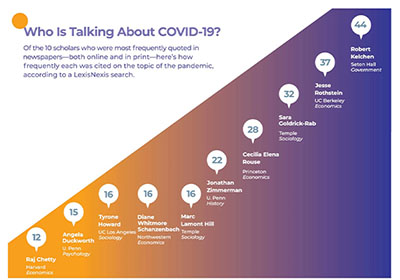Six SESP Scholars Ranked Among Nation’s Most Influential

Six Northwestern University School of Education and Social Policy faculty members were named to Education Week’s annual list of 200 influential academics in education policy for their ability to move ideas from academic journals into the national conversation.
It’s the second year in a row SESP has had six scholars named to the list and the 12th straight appearance for School of Education and Social Policy Dean David Figlio, Orrington Lunt Professor of Education and Social Policy. Figlio, an economist, was named to the inaugural list of 54 Edu-Scholars in 2010 and has been recognized as an influential scholar every year since then.
Diane Schanzenbach, director of the Institute for Policy Research and the Margaret Walker Alexander Professor at the School of Education and Social Policy, ranked highest on the list and was one of the top 10 scholars most frequently quoted in online and print newspaper stories about the COVID-19 pandemic.
 Schanzenbach is a labor economist who studies policies that try to improve the lives of children in poverty, including education, health, and income support policies. Her recent work has focused on tracing how major public policies such as SNAP (formerly the Food Stamp Program) and early childhood education impact children throughout life.
Schanzenbach is a labor economist who studies policies that try to improve the lives of children in poverty, including education, health, and income support policies. Her recent work has focused on tracing how major public policies such as SNAP (formerly the Food Stamp Program) and early childhood education impact children throughout life.
In addition to Figlio and Schanzenbach, the following School of Education and Social Policy faculty members were included in the 2021 Edu-Scholar Public Influence Rankings:
- Larry Hedges, Board of Trustees Professor of Statistics and Social Policy
- Kirabo Jackson, Abraham Harris Professor of Education and Social Policy
- Carol Lee, Professor Emeritus, Learning Sciences
- James Spillane, the Spencer T. and Ann W. Olin Professor in Learning and Organizational Change
View the 2021 Edu-Scholar Public Influence Rankings
The rankings were created by Education Week blogger Frederick M. Hess to recognize scholarship that impacts the real world. Hess, the American Enterprise Institute director of education policy, used nine metrics to calculate how well university-based academics connect with the general public on academic research findings.
He admits “this whole endeavor is an imprecise, highly imperfect exercise” but has said “if readers want to argue the relevance, construction, reliability, or validity of the metrics or the rankings, I’ll be happy as a clam.”
The list includes the top finishers from the previous year plus ‘at-large’ nominees chosen by a committee. Here’s a full explanation of the scoring process.
The rankings, of course, “include only a sliver of the faculty who are tackling education or education policy," Hess wrote. Given that the ratings are a snapshot, the results also favor scholars who published a successful book or a big study over the last year, he said.
Still, the top books don’t seem to be changing. Carol Dweck’s Mindset: The New Psychology of Success continues to top the charts—15 years after its initial publication. Other top books were Angela Duckworth’s Grit: The Power of Passion and Perseverance (2016), Richard Rothstein’s The Color of Law: A Forgotten History of How Our Government Segregated America (2018), Jonathan Zimmerman’s The Amateur Hour: A History of College Teaching in America (2020), and Christopher Emdin’s For White Folks Who Teach in the Hood (2016).
“Remarkably, aside from Zimmerman’s volume, these are the same books that held the top spots last year,” Hess wrote. “I always find this set of titles a particularly revealing window into the state of the education conversation.”